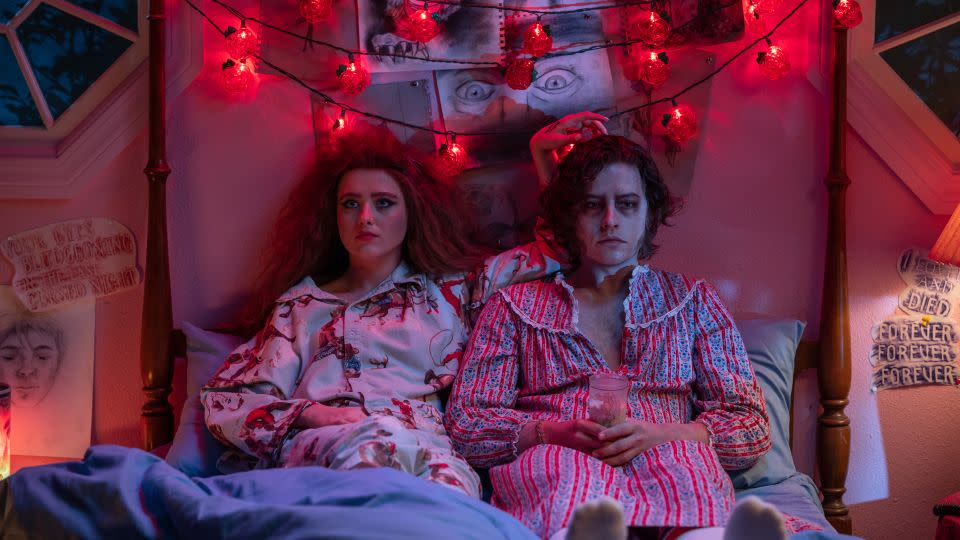Opinion: ‘Lisa Frankenstein’ is giving us a new kind of monster
- Oops!Something went wrong.Please try again later.
- Oops!Something went wrong.Please try again later.
- Oops!Something went wrong.Please try again later.
Editor’s Note: Noah Berlatsky (@nberlat) is a freelance writer in Chicago. The views expressed here are his own. View more opinion on CNN.
In Mary Shelley’s 1818 pioneering gothic novel, “Frankenstein,” obsessed scientist Victor Frankenstein decides to create life, stereotypically the province of women — just as Shelley decided to create a literary novel, at that time, stereotypically the province of men. The monster Victor creates is a monster because it was brought to life by a man, just as the book was considered monstrous because it was brought to life by a woman. Creation is uncontrollable, misshapen and uncategorizable; it keeps bursting out of the gendered graves in which society tries to bury it.

Currently, women are — painfully, inch by inch — starting to get more opportunities to direct films in a Hollywood that has long been almost exclusively a boys’ club. It makes sense, in that context, that we’ve gotten several more or less feminist reworkings of the Frankenstein story, including “Lisa Frankenstein,” and last year’s “Poor Things.”
“Poor Things,” directed by Yorgos Lanthimos, was widely praised for its portrayal of a re-animated woman who defies her creator to create herself. The new “Lisa Frankenstein,” by Zelda Williams in her directorial debut, hits some of the same notes. But, to its credit, it presents women seizing the means of creation as a more haphazard and bloody endeavor, subject to ugly vacillations, spikes of anger and confusion on the way to ambivalent, stitched-together empowerment.
The script, written by Diablo Cody (“Juno,” “Jennifer’s Body”) is set in 1989, and when it starts out, it looks like an 80s teen comedy pastiche. Lisa (Kathryn Newton) is a shy, traumatized teen recovering from the death of her mother. She’s trying to navigate her dad’s remarriage, a new school and an evil, aggressively normal suburban step-mom (Carla Gugino.) Lisa’s overly perky but kind-at-heart cheerleader step-sister, Taffy (Liza Soberano), tries to be welcoming. For real comfort, though, Lisa hangs out at the local cemetery, where she puts flowers on the grave of a sad, nameless bachelor (Cole Sprouse), wounded in love.
That sounds, perhaps, like a story of teen outcasts we’ve perhaps heard before. But things quickly go sideways. The sad bachelor’s grave is hit by lightning. The electricity reanimates him, and he staggers and grunts into Lisa’s life as a lovesick zombie.

The monster bachelor lacks some body parts — an ear, a hand. Lisa helps him find substitutes and then sews them on, turning them to (sort of) living tissue by zapping the monster bachelor in Taffy’s semi-broken, sparking tanning bed. As she creates her piecemeal monster and friend, she also recreates herself, embracing her inner goth, her inner hormone-driven teen and her inner murderer.
This is where “Poor Things” and “Lisa Frankenstein” diverge. Bella Baxter in “Poor Things” starts out as a clumsy innocent, but she becomes more knowledgeable and self-confident over time. At the beginning of the film, she’s a monster created by her surgeon/scientist father; at the end, she’s a woman. Lisa’s journey is a lot less straightforward. As the movie goes on, she becomes a creator, in a way that Bella, for all her sexual exploration, never really does. Lisa also becomes weirder and more, not less, erratic. She comes out of her shell to reveal a talent for plotting destruction, an indifference to gore, and a love of REO Speedwagon.
In parallel with Lisa, the movie itself lurches bizarrely from genre to genre, like Williams is stapling it together out of a mishmash of body parts. In one flashback, we learn that Lisa’s mother died from an ax-murder attack right out of “Halloween” or “Friday the 13th”— suddenly a slasher busts through the teen comedy and starts whacking away. The movie’s tone also veers from awkward interpersonal humor to horror grotesque with spurting bodily fluids and absurdist castration fantasies.
Those castration fantasies, and the exuberant, slow-motion blood spatters that go with them, come across as anti-patriarchal exhilaration. Lisa, and Williams, are building something new and ridiculous and glorious, just as 19-year-old Mary Shelley did all those years ago when Lord Byron dared her to write a story of terror. “Lisa Frankenstein” in that context can be seen as a celebration of the monsters that are now possible with women in the director’s chair: Emerald Fennell’s “Saltburn” which reimagined the noir by regendering the femme fatale; Celine Song’s “Past Lives,” which turns the romcom inside out by acknowledging that women’s career and other ambitions occasionally, and legitimately, take precedence over romance.

With those movies, and especially with Greta Gerwig’s mega-hit “Barbie,” it feels like we’ve reached a watershed for women filmmakers. But looking at the actual numbers catalogued in a recent report, the change is grindingly slow. In 2007, women directors helmed a dismal 2.7% of the top 1,700 box office films. Things have gotten somewhat better since then; In 2020, 15% of the top films were directed by women. (The distributor of “Barbie,” and the UK/Ireland distributor of “Saltburn” share a parent company with CNN.)
Still the numbers are not impressive, especially for women of color, who only directed 2.7% of the most popular films in 2023. In fact, in the last three years, all women have actually lost ground, directing only 12% of 2023’s top films. That’s four times as many as 15 years ago. But it also means that, last year, men still directed 88% of the most popular films. That is embarrassing.
It’s also infuriating — and based on the film, Lisa, Williams and Cody are all suitably enraged. The monster bachelor is in some ways Lisa’s fantasy of romance, but he’s also her fantasy of revenge — for the misogynist slasher genre violence which killed her mother and for the gendered expectations which create limited roles for her. She wants to build a self out of more variegated and ugly bits. But instead, more than 200 years later, Mary Shelley still wouldn’t have a place in a suburban high school, or in most movie studios. Who can blame Lisa for wanting to stomp around and break things?
I suspect that “Lisa Frankenstein” is too lumpy and strange to hit the popular imagination like “Barbie” or “Poor Things,” or, for that matter, a standard male-directed, great man biopic like “Oppenheimer.” But, as with Mary Shelley’s book, the film’s grotesqueness is why it’s powerful and memorable. Women are still told that they are wrong for being, or wanting to be, creators. And so Lily, like Mary before her, decides to be the wrong thing — a clumsy, mottled, sewn together bag of violence, anger, desire and imaginative hiccups. Half of humanity still isn’t allowed to make movies in Hollywood, for the most part. “Lisa Frankenstein” shows why that’s a loss for all of us — and Lisa is ready to cut up the patriarchy to prove it.
For more CNN news and newsletters create an account at CNN.com

